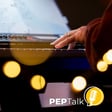
With Lena Dacca
Here at Solas we love partnering with Christian Union groups on university campuses across the UK. Today we speak with a student from Lancaster University where Andy spoke at their mission week this year. So what is a mission week? What sort of topics appeal to students? And how would you convince a history student that Jesus really rose from the dead? All that and more in this episode of PEP Talk.
Lena Dacca is a history student at Lancaster University, and recently served on her Christian Union’s committee as the Mission Week Coordinator. She is an aspiring historian and evangelist, and is especially passionate about sharing the gospel in a way which points people toward both the evidence for Christianity, and the transformative love of Jesus.



















